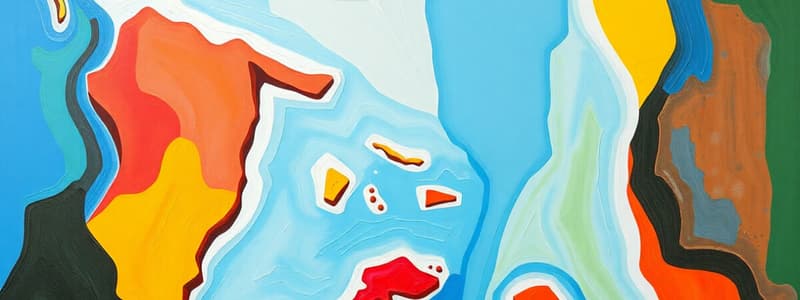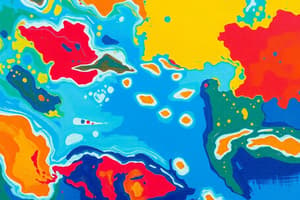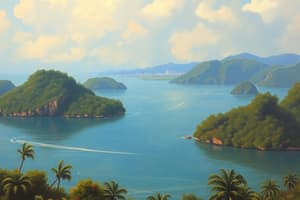Podcast
Questions and Answers
What characterizes the limestone islands of the Caribbean compared to volcanic islands?
What characterizes the limestone islands of the Caribbean compared to volcanic islands?
- They have deeper and more fertile soils.
- They have a greater variety of landscapes.
- They are generally flat with limited water resources. (correct)
- They are formed from volcanic activity.
Which statement about the Greater Antilles is accurate?
Which statement about the Greater Antilles is accurate?
- They consist entirely of low-lying islands.
- They lack any mountainous regions.
- Cuba features high plains known as plateaux. (correct)
- All islands in the Greater Antilles are coral-built.
Which phenomenon has significantly altered the shapes of some volcanic peaks in the Caribbean?
Which phenomenon has significantly altered the shapes of some volcanic peaks in the Caribbean?
- Erosion from wind and rain. (correct)
- Land reclamation projects.
- Subterranean water flow.
- Coral reef formation.
What is a common feature of smaller volcanic islands in the eastern Caribbean?
What is a common feature of smaller volcanic islands in the eastern Caribbean?
What recent geological event has impacted Saint Vincent?
What recent geological event has impacted Saint Vincent?
What is the primary composition of the soil found on limestone islands?
What is the primary composition of the soil found on limestone islands?
How do the mountain ranges in the Caribbean affect settlement and transportation?
How do the mountain ranges in the Caribbean affect settlement and transportation?
What kind of topography do limestone islands typically exhibit?
What kind of topography do limestone islands typically exhibit?
Flashcards
Caribbean Islands Variety
Caribbean Islands Variety
The Caribbean islands show a diverse range of landforms, including mountains, plains, and volcanic features.
Greater Antilles Mountains
Greater Antilles Mountains
Most of the Greater Antilles islands (except Cuba) have mountainous terrain.
Cuba's Plateaus
Cuba's Plateaus
Cuba has large, flat areas called plateaus, unlike the rest of the Greater Antilles.
Limestone Islands
Limestone Islands
Signup and view all the flashcards
Volcanic Islands
Volcanic Islands
Signup and view all the flashcards
Island Erosion
Island Erosion
Signup and view all the flashcards
Caribbean Rivers
Caribbean Rivers
Signup and view all the flashcards
Island Water Supply
Island Water Supply
Signup and view all the flashcards
Study Notes
Caribbean Physical Features
- The Caribbean landscape varies, with high and low landforms, rivers, valleys, swamps, and diverse island types (mountains, islets, rocks).
- Islands vary in size and shape, affecting their features and resources.
- The Greater Antilles islands are mountainous, except for Cuba, which has wide plains (plateaus) exceeding 1000 meters.
- Mountain ranges in the Caribbean often pose challenges to transportation.
- Many islands have mineral deposits.
- Some Caribbean islands have low-lying limestone plains and steep limestone mountains (with caves), and rivers that disappear underground.
- Volcanic islands in the eastern Caribbean are often rugged and mountainous.
- Past volcanic eruptions have impacted the landscape of some islands, creating hot springs, crater lakes, and fumaroles. Erosion has also shaped the islands.
- The presence of water features like rivers, valleys, and streams create scenic beauty that benefits tourism.
- Limestone islands, built from coral, are flat with few rivers or lakes.
- Some limestone islands, like Barbados, are high above sea level and are often infertile.
- Limestone islands like those in the Bahamas, have less dramatic scenery but coral reefs and submarine plateaus attract visitors.
Studying That Suits You
Use AI to generate personalized quizzes and flashcards to suit your learning preferences.




